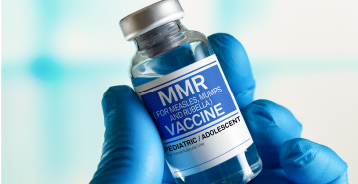Prevent mumps and measles
 Medical Conditions
Medical Conditions
We need to process your personal information for you to interact with this website. We also use Cookies to enhance your experience. Please accept the Website Ts and Cs and Data Protection and Privacy Policy to fully access the website.
Antibiotics have revolutionised medicine, transforming infections that were once fatal into manageable conditions. They have saved countless lives and fundamentally altered how we approach the treatment of infections.
However, the effectiveness of antibiotics is under significant threat due to the rise of antimicrobial resistance (AMR). AMR is when bacteria, viruses, fungi, and parasites adapt and change to such an extent that it becomes unresponsive to antibiotics, making infections harder to treat.
Why AMR is happening
AMR has emerged from the overprescription and overuse of antibiotics. Globally, a staggering number of prescriptions for antibiotics are written for conditions that either do not need antibiotics or are caused by viruses, which antibiotics have no effect against, like colds, flu, and most sore throats.
Antibiotics kill susceptible bacteria, but antibiotic-resistant strains, even if initially present in small numbers, survive and multiply. Over time, the resistant strains can become dominant, leading to infections that are increasingly difficult to treat with existing antibiotics.
The misuse of antibiotics is especially prevalent in livestock agriculture, where they are used to fight infections and promote growth.
The global impact of AMR
According to a World Health Organization (WHO) article on antimicrobial resistance, “it is estimated that bacterial AMR was directly responsible for 1.27 million global deaths in 2019 and contributed to 4.95 million deaths.”
AMR affects people in all countries and at all income levels, however people in low- and middle-income groups are affected the most.
Proactive health management – taking steps to prevent infections
Taking proactive steps to prevent infections is essential for minimising the risk of developing illnesses that require antibiotic treatment, these include:
How to address AMR
Responsible antibiotic use in healthcare and agriculture remains key. While the responsible prescription of antibiotics is up to healthcare professionals, it is still your right to ask if the antibiotics are truly necessary. The full course of antibiotics should be taken to prevent the survival of partially resistant bacteria.
The rise of AMR represents a formidable challenge to global healthcare. Without considered and collective action, we risk entering a post-antibiotic era where common infections could once again become deadly.
References:
Antimicrobial resistance. WHO. 2023. Available here.
Be Antibiotics Aware: Smart Use, Best Care. CDC. Accessed 2024. Available here.
Why antibiotics aren't always the answer for an illness. Mayo Clinic Health System. 2023. Available here.
35 Expert tips to avoid germs and stay healthy. Online First Aid. Accessed 2024. Available here.